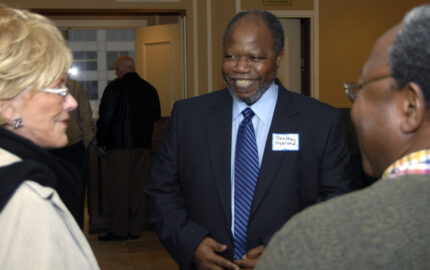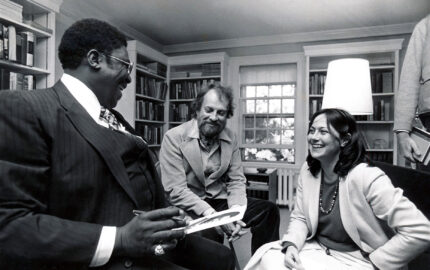Three Nieman Fellows have been honored by the National Headliner Awards program, which is one of the oldest and largest annual contests recognizing journalistic merit in print, broadcast and online.
Guy Raz, NF ’09, along with NPR colleagues Travis Larchuk and Rick Holter, received first-place honors for a feature that aired on “All Things Considered.” “Every Plant Has Meaning on ‘The Island of Bar Codes’ ” describes Plummers Island, the “most studied island in North America,” where scientists have been developing a method of sequencing the DNA of every plant and animal on earth.
Elizabeth Leland, NF ’92, was the second-place recipient of honors for a variety of feature stories she wrote for The Charlotte (N.C.) Observer. Among them were a profile of a local eccentric who discovered that he suffers from Asperger’s syndrome and two pieces about a family helping their daughter deal with a rare brain affliction.
Margie Mason, NF ’09, and her Associated Press colleague Martha Mendoza, received a third-place award in the health and medical science category for the five-part series “When Drugs Stop Working.” The series, developed during her Nieman Fellowship in Global Health Reporting, explores how doctors are losing ground in treating major diseases because of the extensive use of antibiotics in agriculture.
Two Nieman Fellows received Sigma Delta Chi Awards from the Society of Professional Journalists for outstanding journalism published or broadcast in 2009.
Mary Kay Magistad, NF ’00, who covers Asia for Public Radio International’s “The World,” received an award for “Created in China,” a five-part series that looked at the decline in Chinese innovation over the last 500 years and the government’s efforts to reverse the trend.
Chris Cobler, NF ’06, was part of the reporting team at the Victoria (Tex.) Advocate that received an award for a 16-month investigation called “Fatal Funnel” about a smuggling route in Texas that brings drugs and people into the U.S. and sends cash and guns into Mexico.
Read his obituary in The Washington Post »Angus MacLean Thuermer, a foreign correspondent turned CIA official, died on April 14th of pneumonia. He was 92.
While studying German in Berlin after college, he began working for The Associated Press to earn extra money. Thuermer covered major events leading up to World War II including Kristallnacht and Germany’s invasion of Poland.
After the Japanese bombed Pearl Harbor and the U.S. declared war, he was detained in Germany with 135 other journalists, diplomats and American officials. To pass the time and because to do otherwise would be “unconstitutional,” Thuermer later told The Washington Post, he and two other prisoners formed the Bad Nauheim Wurlitzer Cup Series, a four-team baseball league. They whittled a tree branch to make a bat, which he donated to the National Baseball Hall of Fame nearly 50 years after his release.
Before retiring in 1978 after 26 years with the CIA, Thuermer served as the agency’s “spooksman,” offering “no comment” to reporters, and he was the station chief in Berlin and New Delhi, according to the obituary in the Post.
He is survived by his wife, Alice, two daughters, one son, and a granddaughter.
Read his obituary in the Anchorage Daily News »John Strohmeyer, a Pulitzer Prize-winning editor, died of heart failure on March 3rd at his winter home in Crystal River, Florida. He was 85.
Strohmeyer spent nearly 30 years at the Bethlehem (Penn.) Globe-Times where he wrote a series of editorials on racial unrest that won a Pulitzer Prize in 1972. He was the paper’s editor from 1956 until 1984, when he was awarded an Alicia Patterson Fellowship and left the paper to write the book “Crisis in Bethlehem: Big Steel’s Struggle to Survive.” He later taught at Lehigh University for a year before becoming the Atwood Professor of Journalism at the University of Alaska Anchorage. At the time of his death, he was writer in residence at the university and writing columns for the Anchorage Daily News.
Strohmeyer also wrote “Extreme Conditions: Big Oil and the Transformation of Alaska” and “Historic Anchorage: An Illustrated History.”
He is survived by his wife, Sylvia Broady, and one son, one daughter, and eight grandchildren. His first wife, Nancy Jordan, died in 2000, and one son died in 1998.
Read his obituary at WWL-TV »Phil Johnson, a three-time Peabody award-winning broadcaster in New Orleans, died March 22nd after a lengthy illness. He was 80.
Johnson, a native of New Orleans, graduated from Loyola University and worked in print journalism in Miami and Chicago before returning to his hometown a year after his Nieman Fellowship to become promotions director for WWL-TV.
Two years later he was brought into the news department and began delivering editorials on air, a practice he continued for 37 years. “Beginning today and every weekday thereafter, this station will present editorial opinion—a living, vigorous commentary on all things pertaining to New Orleans, its people, and its future,” Johnson said in his first editorial, adding that his goal was “commentary designed to stimulate thought, to awaken in all of us an awareness of our responsibilities, not only to our community but to each other and to ourselves,” according to the obituary on WWL-TV’s Web site.
Johnson traveled internationally for a number of documentaries he produced, three of which were honored with George Foster Peabody Awards. He was inducted into the Greater New Orleans Broadcasters Association’s New Orleans Broadcasting Hall of Fame and received Loyola’s highest honor as well as a Lifetime Achievement Award from the Press Club of New Orleans.
He is survived by his wife, Freida, five children, and eight grandchildren.
Read his obituary in The Cheraw (S.C.) Chronicle »Andrew M. “Mac” Secrest, a reporter, publisher, educator and vocal critic of segregation, died on April 17th after complications from surgery for throat cancer. He was 86.
As owner and publisher of The Cheraw (S.C.) Chronicle weekly from 1953 to 1968, he pushed back against those who advocated resistance to the U.S. Supreme Court’s ruling in Brown v. Board of Education, among them Senator Strom Thurmond and many fellow newspaper editors in the South. He faced threats and attacks on his home.
During the height of the civil rights movement, he served as a negotiator and mediator for the federal government and worked with Martin Luther King, Jr. to help bring about a peaceful solution in Selma, Alabama.
After Secrest sold the Chronicle, he taught journalism at the University of North Carolina at Chapel Hill for five years. He moved to Durham to help establish the communications department at North Carolina Central University, retiring nine years later. In 2007 he was inducted into the UNC School of Journalism’s Hall of Fame.
Robert A. Caro has been named to the inaugural class of the New York Library Association’s New York State Writers Hall of Fame.
In February Caro received the 2009 National Humanities Medal, which “honors individuals or groups whose work has deepened the nation’s understanding of the humanities, broadened our citizens’ engagement with the humanities, or helped preserve and expand Americans’ access to important resources in the humanities,” according to the National Endowment for the Humanities Web site.
Caro, who started his career as a newspaper reporter, is best known for his Pulitzer Prize-winning biographies of New York master planner Robert Moses (“The Power Broker”) and President Lyndon Johnson (“The Years of Lyndon Johnson: Master of the Senate”). He is working on the fourth volume of the Johnson biography.
Richard C. Longworth reports: “I’m combining my Midwestern roots with my years as a foreign correspondent (for UPI and the Chicago Tribune) to carve out a new career in what were supposed to be my retirement years. I’m a senior fellow at the Chicago Council on Global Affairs, working mostly on the impact of the global economy on Chicago and the Midwest. My book, ‘Caught in the Middle: America’s Heartland in the Age of Globalism’ (Bloomsbury) went through three printings and is out now in paperback. In the two years since it came out, I’ve given some 180 presentations around the Midwest. I spent a year as Distinguished Visiting Scholar at DePaul University and have lectured at most of the major universities in the region. All this has led to the founding of two centers here at the council—the Global Chicago Center, devoted to the study of Chicago’s transformation from industrial city to global city, and the Global Midwest Initiative, sponsoring reports and seminars on the Midwest and how, for the most part, it’s flunking the economic, political and social challenges produced by this new economy. Mostly, I’m having an exciting time, after a lifetime in other people’s countries, rediscovering my own home turf.”
Margot Adler received the Association for the Study of Women and Mythology’s first Demeter Award for Leadership in Women’s Spirituality at the association’s conference in April. Adler, an NPR correspondent based in New York, is the author of “Drawing Down the Moon,” a study of contemporary nature religions.
Gustavo Gorriti has launched an investigative reporting Web site that covers the Peruvian government, IDL-Reporteros. In his first column, Gorriti wrote that the Spanish-language site’s mission is to “report, investigate, discover and publish the cases and topics that affect the rights, property, or destiny of the people.”
 Doug Cumming’s book “The Southern Press: Literary Legacies and the Challenge of Modernity” was published by Northwestern University Press last year.
Doug Cumming’s book “The Southern Press: Literary Legacies and the Challenge of Modernity” was published by Northwestern University Press last year.In the book, Cumming, a journalism professor at Washington and Lee University and former staff member of The Atlanta Journal-Constitution and The (Raleigh, N.C.) News & Observer, traces the history of Southern newspapers. Hodding Carter III, NF ’66, wrote the foreword.
 William Dietrich’s historical novel “The Barbary Pirates” was published by Harper in March. The novel is the fourth in his series of Ethan Gage adventures and follows the explorer as he searches for the mirror of Archimedes. As with many of his novels, Dietrich blends historical details into the narrative, along with research and real-life details from his time as a journalist.
William Dietrich’s historical novel “The Barbary Pirates” was published by Harper in March. The novel is the fourth in his series of Ethan Gage adventures and follows the explorer as he searches for the mirror of Archimedes. As with many of his novels, Dietrich blends historical details into the narrative, along with research and real-life details from his time as a journalist.***
Gene Weingarten received a Pulitzer Prize for Feature Writing in April for “Fatal Distraction” in The Washington Post Magazine. Fifteen to 25 children a year die of hyperthermia after parents leave them in the backseats of cars, and Weingarten explored whether parents should be charged with a crime and how they cope with their loss.
Weingarten, who writes the Below the Beltway column for the Post, won a Pulitzer Prize in 2008 for “Pearls Before Breakfast.” He convinced a world-class violinist to play in a Washington, D.C. Metro station during rush hour to see how commuters would react; passers-by gave him a total of $32.17 for 43 minutes of playing.
In an online chat at washingtonpost.com after the second award, Weingarten said, “I think this [“Fatal Distraction”] story had greater consequence, yes. The first [“Pearls Before Breakfast”] was an unabashed stunt. But both, I think, succeeded in making people think differently about their lives.”
Before joining the Post, Weingarten was editor of The Miami Herald’s Tropic Magazine, which won two Pulitzer Prizes under his direction.
Kabral Blay-Amihere reports on his new book and role in the government of Ghana: “My third book since my Nieman year—‘Between the Lion and the Elephant: Memoirs of an African Diplomat’—was launched on March 24, 2010. It is a recollection of my experiences as an ambassador for my country, Ghana, in two conflict zones, Cote d’Ivoire and Sierra Leone. It catalogs efforts by the international community, notably the Economic Community of West African States and the United Nations, that resulted in the resolution of the decade-long civil war in Sierra Leone (symbolized by the lion) and peace initiatives in Cote d’Ivoire (the elephant). The book also offers rich perspectives into the Ghana Foreign Service and several initiatives and innovations I undertook as an envoy for my country for seven years. ... Meanwhile, I currently serve as the chairman of the National Media Commission [NMC], a constitutional body charged with the promotion of press freedom and professional standards in Ghana. It is an elective post. The NMC is made up of 18 members, representing a broad spectrum of media stakeholders. I represent the Ghana Journalists Association on this body.”
Deborah Amos, who is a foreign news correspondent for NPR, received the Edward R. Murrow Lifetime Achievement Award for her radio work. It was presented by the Edward R. Murrow School of Communication at Washington State University.
Deborah Schoch joined the California HealthCare Foundation Center for Health Reporting at the University of Southern California’s Annenberg School for Communication & Journalism in March as a senior writer. The center’s goal is to expand and improve coverage of health care in California. It will be supported by a three-year grant of about $3.3 million from the California HealthCare Foundation. Schoch left the Los Angeles Times where she covered health care and the environment for 18 years.
 Carol Bradley’s first book “Saving Gracie: How One Dog Escaped the Shadowy World of American Puppy Mills” was released by Wiley in March.
Carol Bradley’s first book “Saving Gracie: How One Dog Escaped the Shadowy World of American Puppy Mills” was released by Wiley in March.A review in Library Journal called the book about a dog that was rescued from a Pennsylvania puppy mill a “compelling account” and an “excellent exposé of a shady industry.” Bradley, who covered animal welfare issues as a newspaper reporter, studied animal law during her Nieman year.
Andrea McCarren is working as a full-time multimedia journalist for WUSA-TV, the CBS station in Washington, D.C., after spending a year as a freelance reporter and producer. In addition to reporting for television and the Web, McCarren shoots and edits some of her own stories, a role she embraces.
***
 Craig Welch’s first book “Shell Games: Rogues, Smugglers, and the Hunt for Nature’s Bounty” was published in April by William Morrow. It focuses on the black market trade in unusual marine creatures from Puget Sound and the federal agents who work to catch the thieves. Welch is the environment reporter for The Seattle Times.
Craig Welch’s first book “Shell Games: Rogues, Smugglers, and the Hunt for Nature’s Bounty” was published in April by William Morrow. It focuses on the black market trade in unusual marine creatures from Puget Sound and the federal agents who work to catch the thieves. Welch is the environment reporter for The Seattle Times.
Alfredo Corchado, Mexico bureau chief for The Dallas Morning News, is the 2010 winner of the Elijah Parish Lovejoy Award for courageous journalism to be given at Colby College in September. He is being recognized for his coverage of issues involving the U.S.-Mexico border.
Read her remarks from the award presentation »Marcela Valdes was one of two critics to receive the first annual Roger Shattuck Prize for Criticism. It is designed to support and encourage emerging critics. Valdes, who specializes in writing about Latin American arts and culture and was this year’s arts and culture fellow, is a freelance book critic.



